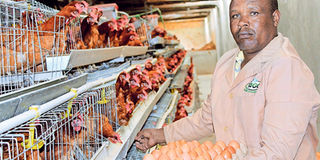Don’t rush to adopt animal production technologies, farmers told

Chicken kept under the battery cage system. Farm animal welfare bodies caution that keeping chicken in this system restricts their freedom of movement. PHOTO | FILE | NATION MEDIA GROUP
What you need to know:
- Some of the things farmers are doing in efforts to optimise production include excessive use of antibiotics, growth-enhancing substances or crowding birds in small cages to boost incomes.
- But experts warn against such practices, saying presence of antibiotics in food is harmful to human health and that birds should be kept in a spacious environment.
- Tennyson Williams, Director for Africa at World Animal Protection, noted that although animal welfare movement is starting to gather pace, more work needs to be done.
- Williams explained that the survey exposes who’s leading the way on animal welfare, and who’s lagging and showing little concern for animal cruelty.
As farmers turn to new technologies to enhance their poultry yields, experts are urging that the innovations must be comfortable and should not expose the birds to diseases.
Some of the things farmers are doing in efforts to optimise production include excessive use of antibiotics, growth-enhancing substances or crowding birds in small cages to boost incomes.
But experts warn against such practices, saying presence of antibiotics in food is harmful to human health and that birds should be kept in a spacious environment.
Dr Victor Yamo, the farming campaign manager at the World Animal Protection, said poultry battery cage system does not allow birds to enjoy their freedom and exposes them to diseases.
He warned farmers against adopting such technologies blindly, adding that the battery cage system could be phased out by 2023.
Dr Yamo noted that even in a free-range farming system, birds need clean water, a balanced diet and the environment must be comfortable.
FARM ANIMAL WELFARE
“In 2019, we did a survey and the results showed consumers are willing to pay more if they are assured that the meat products are free of antibiotics and chemicals and that the animals were raised and transported in humane conditions before being slaughtered humanely,” said Dr Yamo, who was speaking during the launch of the 8th annual report of Business Benchmark on Farm Animal Welfare (BBFAW) that ranks 150 global food companies on farm animal welfare standards.
The report showed that 87 per cent of the companies acknowledge farm animal welfare is a relevant business issue, with 75 per cent of them having policies on animal welfare.
“Deep litter system is the most preferred. For optimal productivity, the recommended stocking density for broilers, for instance, is 30kg per metre square and this is hardly achievable in the battery cage system. Remember if you treat the animals well, they produce better but if you mishandle them, their productivity declines,” said Dr Yamo.
He said companies that fail to take responsibility for ensuring the welfare of animals farmed for food can expect heightened scrutiny from consumers of animal products.
Tennyson Williams, Director for Africa at World Animal Protection, noted that although animal welfare movement is starting to gather pace, more work needs to be done.
Williams explained that the survey exposes who’s leading the way on animal welfare, and who’s lagging and showing little concern for animal cruelty.
“The exploitation of billions of animals on factory farms not only causes mass suffering of animals but also exposes humans to diseases. Farm animals have suffered in cruel conditions for long enough, and it’s time to change that,” he said.



